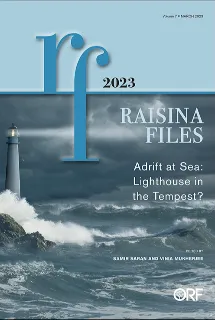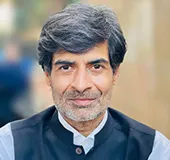We are publishing Raisina Files 2023 in what could be a year that shapes the rest of the century. The energy of a post-pandemic world is palpable, even infectious, as many seek to now build a fair and inclusive world. Yet this optimism, buoyed up by our imagination, is tempered by a very real war—a war where both aggressor and respondent agree that peace can be attained only by a decisive victory in the battlefield.
Meanwhile, our planet is taking no prisoners, and extreme weather events and disasters are pushing communities and countries to the very limits of their resilience. Technology is seeking a meta-verse away from the inefficiencies of the real world, framed in codes and algorithms that both assist, and set that world aflame. Societies that inhabit the streets, through their travails, are underwriting the valuations of corporations that feed off the virtual.
These and other equally significant developments are the point of departure for this edition of ORF’s annual journal. The essays contributed by our brilliant authors attempt to answer questions that are provoked by the current kaleidoscope of disruptions and churning. Some are a consequence of recent developments, others are legacy, and still others are waiting in the shadows to emerge.
The Russia-Ukraine conflict has not only cost thousands of lives, but has also inflicted significant harm on the rest of the world. From inflation due to rising energy prices to shortages in food and fertilisers, these consequences have dealt a harsh blow particularly to developing countries. To hurdle these obstacles is as urgent as the quest for an end to the hostilities in Europe.
The pandemic, the war, and in some cases poor governance and ill-advised projects and partnerships have also instigated a debt crisis in certain parts of the world. Sri Lanka has collapsed and Pakistan is on the verge, and a number of island nations and small economies are struggling to meet the dual obligations of debt service and responding to climate change. We are seeing a new fragility in our economic systems that the Paris Club and Bretton Woods institutions are unable to respond adequately to, casting doubt on their relevance and making the need for reforms even more clear.
Some stark challenges are self-created, including the repercussions of the battle for dominance in the technology domain. The digitalisation of societies has created new theatres of competition, new vulnerabilities for people, and new zero-sum games between nation-states. From controlling supply chains to asserting the supremacy of jingoistic narratives, unfamiliar impulses have weaponised technology, once designed to serve the public good. GeoTech is now as complex as geopolitics and we will have to find new approaches to engage with it, and script arrangements that will allow us to catalyse the digital benefits while managing the accompanying harms.
Legacy challenges have not abated, either. At the Taiwan Strait, the heightened tensions are a result of history being rewritten by an expansionist regime in Beijing that is obsessed with drawing the map of Asia to its liking. A new muscularity is pairing up with legacy to alter the nature of the crisis and indeed any response to it.
We are also seeing nostalgic rediscoveries from the past. In West Asia, old relationships are being rekindled to shape future pathways. Elsewhere, states are finding succour in their ancient texts to create 21st-century architectures for governance, growth, and partnerships. Communities and countries are amplifying their own lived experiences to shape the agenda and purpose of multilateral platforms.
Amidst all this, we are being made to reflect on three key relationships that define each one of us today.
The first is our relationship—individual and collective—with our planet. We now know that climate change is the result of the breakdown of our compact with Earth. From air pollution and extreme weather patterns to droughts and flooding events—all are a loud manifestation of our failure to abide by this agreement. How do we respond to this failure? Who is in breach and who underwrites the costs of reparation? These are questions that we must respond to at the earliest if we are to arrest the likelihood of catastrophic happenings, signs of which are already becoming increasingly visible.
The second is our relationship with technology. From combustion engines to electric vehicles, from telegrams to the metaverse—can tech continue to remain a force of good that promotes inclusive growth and benefits many? And how can we ensure this? How can we make boardrooms more responsible to communities and how can algorithms and AI be re-imagined to serve our moral and socio-economic imperatives? What is the role of the sovereign state in all of it?
And the third is how we, as inhabitants of Terra Firma, arrange our lives within our country of birth, and across borders with other nation-states. Are national regimes and nationalities still sacrosanct? Has multilateralism become too dysfunctional, or can we still find the sweet spot where sovereignty and internationalism co-exist? What can help us achieve this and are elected governments still the worthiest of all?
Sixteen essays contained in this volume have engaged with our design and somewhat esoteric musings, and each one of them offers compelling ideas and sober reflections to the reader.
The journal opens with an essay on Europe where, at the time of completing this volume, Russian forces were intensifying their onslaught to capture Bakhmut, considered by the Ukrainians as their fortress. Amidst the backdrop of the prolonged war, Velina Tchakarova writes about the so-called ‘permacrisis’ plaguing the continent: where one problem is quickly being replaced by another, “while European decision-making faces the perpetual challenge of overcoming them.” Yet it is not only wars of attrition that bring about cascading crises; as small states know only too well, even ‘grey-zone’ battles along the continuum of competition and conflict can cause damage beyond the states that are directly involved. This is what Charmaine Misalucha-Willoughby sets out to illustrate, using the story of the Philippines and how it navigates great-power competition. Small states leverage the utility of the world order, she says, because “the benefits outweigh the costs.”
Sri Lanka may be one country that is familiar with the need to weigh benefits and costs, but the question is whether it is faring well. Chulanee Attanayake provides some answers, as she analyses the massive indebtedness of Sri Lanka and offers lessons for those in China’s debt. While Sri Lanka’s current distress is a result of factors that have simmered over decades, another enduring challenge that we examine is that of the Taiwan Strait. Prashant Kumar Singh writes that even as China-Taiwan relations are not ‘ordinary’ state-to-state ties, “they remain among the most complicated examples of how issues of sovereignty, security, and strategic order can be critically intertwined.”
These same issues of security and order manifest themselves in the domain of technology—as Vivek Mishra, Caitríona Heinl, and Nicoló Andreula demonstrate. Vivek takes us through US attempts to decouple from China—“a necessary strategy for the US as China speeds up its tech advancements, many believe, by its use of unfair means.” Caitríona discusses the emergence of outer space as “a growing security and defence domain.” Nicoló then focuses on the Metaverse, and offers recommendations for how we can prevent it from becoming a playground of a few, the same ones, he says, “which have already gained significant market power through centralisation in the physical world.” Stuart Rollo offers a note of caution too, and something bigger: to not let our societies slide towards technopoly, and instead “reassert the social and human element over the technological.” To be sure, however, we can let technology shine in some contexts, as Terri Chapman outlines its crucial role in saving lives and livelihoods during disasters. She uses a gender lens and warns, though, that these tech innovations can create more significant risks for women and girls unless their designs “take into account gender-specific experiences and needs.”
This will be even more important as disasters increase in frequency and intensity because of climate change—the subject of the essays of Ian Kemish and Oluwaseun Oguntuase. Ian writes about the Pacific island states, and how their experience with climate change “will likely presage what is to come for the rest of the planet.” Oluwaseun highlights how partnerships between Africa and India can help us hold back the existential threat.
Partnerships is the same subject of the succeeding three essays, as platforms from the past find favour to respond to the challenges of today. Manjari Singh’s article elaborates on India-UAE-Israel relations, and Sarah Teo outlines a treatise on the continuing relevance of ASEAN in the Indo-Pacific. For her part, Amrita Narlikar shows us how India’s leadership of the G20—built upon its ancient wisdom—could bring us closer to “a more sustainable and equitable world.” Mining that same wisdom, Kajari Kamal outlines lessons for contemporary international relations, and highlights India’s deeply rooted belief that “a state’s prosperity and security is innately intertwined with that of the region and the world.” Bibek Debroy closes the volume with his ode to Democracy—“an end in itself.”
We thank all the authors for their contributions. It is our hope that this publication helps clear some of the cobwebs in our minds, even as it arouses new debates. These are important for our times and we should not look away.
Read the journal here.
The views expressed above belong to the author(s). ORF research and analyses now available on Telegram! Click here to access our curated content — blogs, longforms and interviews.

 PDF Download
PDF Download



 PREV
PREV




